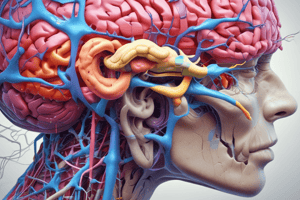Podcast
Questions and Answers
What is the primary role of feature abstraction in sensory processing?
What is the primary role of feature abstraction in sensory processing?
- To enhance the overall intensity of sensory experiences
- To distinguish between different submodalities
- To allow neurons to respond to specific features of a stimulus (correct)
- To combine multiple stimuli into a single perception
Which type of pain is primarily associated with sharp sensations?
Which type of pain is primarily associated with sharp sensations?
- Substance P fibers
- C fibers
- Glutamate pain fibers
- A delta fibers (correct)
How is pain tolerance influenced according to the content?
How is pain tolerance influenced according to the content?
- It is identical for every person regardless of circumstances
- It is solely a psychological phenomenon
- It can vary based on genetics, mental state, and social environment (correct)
- It is determined only by physical factors
Which chemical is not associated with the sensation of pain?
Which chemical is not associated with the sensation of pain?
What term describes the ability to recognize familiar stimuli, such as faces or music?
What term describes the ability to recognize familiar stimuli, such as faces or music?
What type of pain is described as musculoskeletal, easy to localize, and often characterized by aching or throbbing?
What type of pain is described as musculoskeletal, easy to localize, and often characterized by aching or throbbing?
Which neurotransmitters are involved in the transmission of both sharp and burning pain?
Which neurotransmitters are involved in the transmission of both sharp and burning pain?
Which of the following best describes adaptation in the context of sensory processing?
Which of the following best describes adaptation in the context of sensory processing?
What must occur for a signal to be generated at the receptor level?
What must occur for a signal to be generated at the receptor level?
Which type of receptor is characterized by a sustained response with little to no adaptation?
Which type of receptor is characterized by a sustained response with little to no adaptation?
How do phasic receptors adapt to stimuli?
How do phasic receptors adapt to stimuli?
What is peripheral adaptation in sensory processing?
What is peripheral adaptation in sensory processing?
What distinguishes a sensory neuron from other types of neurons?
What distinguishes a sensory neuron from other types of neurons?
Which of the following best describes central adaptation?
Which of the following best describes central adaptation?
Why are graded potentials important in the function of sensory neurons?
Why are graded potentials important in the function of sensory neurons?
What information do tonic receptors primarily inform the nervous system about?
What information do tonic receptors primarily inform the nervous system about?
What is the primary purpose of 1st order neurons in the sensory processing chain?
What is the primary purpose of 1st order neurons in the sensory processing chain?
Which pathway is responsible for transmitting information regarding discriminative touch and vibrations?
Which pathway is responsible for transmitting information regarding discriminative touch and vibrations?
What characterizes the spinothalamic pathways in sensory information processing?
What characterizes the spinothalamic pathways in sensory information processing?
In which way do spinocerebellar pathways differ from other sensory pathways?
In which way do spinocerebellar pathways differ from other sensory pathways?
What is the difference between sensation and perception?
What is the difference between sensation and perception?
What does spatial discrimination in sensory perception allow us to do?
What does spatial discrimination in sensory perception allow us to do?
What role does magnitude estimation play in sensory perception?
What role does magnitude estimation play in sensory perception?
The two-point discrimination test is primarily used to measure what aspect of sensory perception?
The two-point discrimination test is primarily used to measure what aspect of sensory perception?
Flashcards
Somatosensory Pathways
Somatosensory Pathways
Neural pathways carrying sensory information from the body to the brain, crucial for touch, pain, temperature, and position.
First-order neuron
First-order neuron
Sensory neuron whose cell body is in the dorsal root or cranial ganglion, transmitting initial input from the body's periphery to the central nervous system (CNS).
Dorsal column-medial lemniscal pathway
Dorsal column-medial lemniscal pathway
Specific sensory pathway that transmits precise information about touch, vibration, and proprioception (body position) to the thalamus, allowing for precise localization.
Spinothalamic pathway
Spinothalamic pathway
Signup and view all the flashcards
Perceptual detection
Perceptual detection
Signup and view all the flashcards
Magnitude estimation
Magnitude estimation
Signup and view all the flashcards
Spatial discrimination
Spatial discrimination
Signup and view all the flashcards
Two-point discrimination test
Two-point discrimination test
Signup and view all the flashcards
Receptor Level Processing
Receptor Level Processing
Signup and view all the flashcards
Receptor Specificity
Receptor Specificity
Signup and view all the flashcards
Receptive Field
Receptive Field
Signup and view all the flashcards
Transduction (Sensory)
Transduction (Sensory)
Signup and view all the flashcards
Phasic Receptors
Phasic Receptors
Signup and view all the flashcards
Tonic Receptors
Tonic Receptors
Signup and view all the flashcards
Adaptation (Sensory)
Adaptation (Sensory)
Signup and view all the flashcards
Generator/Receptor Potential
Generator/Receptor Potential
Signup and view all the flashcards
Feature abstraction
Feature abstraction
Signup and view all the flashcards
Quality discrimination
Quality discrimination
Signup and view all the flashcards
Pain
Pain
Signup and view all the flashcards
Sharp pain
Sharp pain
Signup and view all the flashcards
Burning pain
Burning pain
Signup and view all the flashcards
Pain neurotransmitters
Pain neurotransmitters
Signup and view all the flashcards
Pain suppression
Pain suppression
Signup and view all the flashcards
Pain tolerance
Pain tolerance
Signup and view all the flashcards
Study Notes
Neuroanatomy & Neurophysiology Part 4
- Three levels of sensory information processing are receptor, circuit, and perceptual level.
Receptor Level
- Stimulus energy must match receptor specificity.
- Stimulus must be applied within the receptive field of the receptor.
- Smaller receptive fields allow more precise localization.
- Transduction—conversion of stimulus energy into a graded potential (EPSP or IPSP).
- Graded potentials must reach threshold in first-order sensory neurons to generate a signal.
Circuit Level
- Processing occurs in ascending pathways
- Information travels through a chain of three neurons:
- First-order neurons have cell bodies in dorsal root or cranial ganglia and carry information from the receptor to the CNS (spinal cord).
- Second-order neurons synapse with first-order neurons and ascend toward the brain. Some branches lead to motor reflexes.
- Third-order neurons have cell bodies in the thalamus and carry information to the correct sensory area of the cerebral cortex.
Processing at the Perceptual Level
- Goal is for information to reach the correct area of the cortex for conscious awareness and localization of the stimulus.
Adaptation
- Adaptation is reduction in sensitivity in the presence of a constant stimulus.
- Peripheral adaptation occurs at the receptor level, reducing the amount of information sent to the CNS.
- Central adaptation occurs in the neural pathways to the brain.
- Phasic receptors adapt quickly and provide information on the rate of change in the stimulus.
- Examples of phasic receptors include lamellar and tactile corpuscles, reacting to the transition between darkness and bright light.
- Tonic receptors have sustained responses with little to no adaptation, providing continuous information about the presence and strength of stimuli.
- Examples of tonic receptors include nociceptors (pain) and proprioceptors.
Pain
- Pain is a helpful warning sign of tissue damage, motivating action.
- Extreme temperature and pressure are painful stimuli.
- Pain chemicals include histamine, K+, ATP, acids, bradykinin, etc.
- Sharp pain: carried by smallest, myelinated A delta fibers.
- Burning pain: carried by slower, nonmyelinated C fibers.
- Neurotransmitters involved in pain include glutamate and substance P.
- Pain information ascends primarily through the spinothalamic tract.
- Pain suppression is achieved through endogenous opioids.
Pain Tolerance
- Pain sensitivity varies and can be influenced by genetics, mental state, gender, and social isolation.
Pain Terminology
- Somatic pain: related to musculoskeletal structures.
- Visceral pain: related to organs.
- Referred pain: pain perceived as originating from a different location than its source.
- Phantom pain: perceived pain in a limb that has been amputated.
Special Senses: Chapter 15 of your Textbook
- This chapter is devoted to the special senses of taste, smell, vision, hearing, and equilibrium.
Taste
- About 10,000 taste buds are located on the tongue in papillae.
- Three types of papillae: fungiform, vallate, and foliate.
- Taste buds have gustatory hairs (receptors) for food chemicals.
- Receptors (gustatory hair cells) are activated, depolarize, release neurotransmitters.
Smell
- Olfactory epithelium in the nasal cavity contains olfactory sensory neurons with radiating olfactory cilia.
- Olfactory neurons receive and transmit signal of odorants to the brain.
- Olfactory neurons have specific thresholds and adapt quickly (to a certain level of stimulus)
Studying That Suits You
Use AI to generate personalized quizzes and flashcards to suit your learning preferences.




